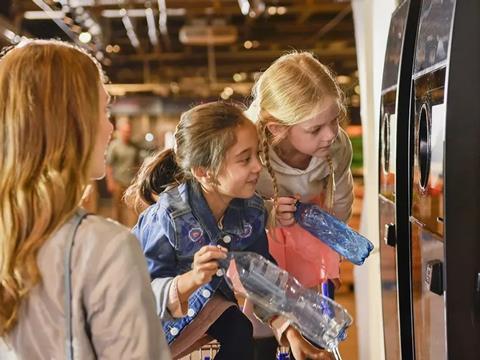
Hungary has launched its new deposit return scheme (DRS) for single-use drink containers in a collaboration between TOMRA and central system administrator MOL Hulladékgazdálkodási Zrt. (MOHU) – a move hoped to optimize the process of returning used packaging for new recyclers.
Excluding milk and milk-based beverages, the DRS accepts single-use aluminium cans and glass or plastic bottles for ready-to-drink or concentrated beverages. These must be between 0.1 litres and 3 litres in size.
A deposit of 50 Hungarian forint, or approximately €0.13, is paid by consumers when they purchase an eligible drink, and it is refunded when the empty container is returned for recycling. In Hungary, these can be returned at grocery retailers exceeding 400m2 in size, as well as voluntary and manual sites.
Over 1000 high-volume reverse vending machines (RVMs) have been installed at medium and large locations like supermarkets and hypermarkets across Hungary. More will be rolled out across the course of this year, according to TOMRA.
An RVM is capable of automatically identifying and sorting drink containers when they enter the machine; it then pays out the appropriate refund in a process said to be more efficient and secure than manual return processes.
It is hoped that the new DRS will fulfil MOHU’s goals to reduce litter and uplift a circular economy. TOMRA adds that the system introduces Extended Producer Responsibility and aims to meet the 90% collection target for plastic beverage bottles by 2029, as per the European Union’s Single-Use Plastics Directive.
“We applaud Hungary’s bold steps toward a circular future, with today’s launch of the deposit return system a milestone in transforming waste management and promoting recycling,” said Dávid Bakos, managing director Hungary at TOMRA Collection. “We look forward to working with MOHU further to secure solid public participation in the deposit return system and ensure a convenient network of return points for recycling.”
“It’s important to emphasize that cooperation is needed to protect our environment. Everyone has a responsibility: beverage producers, consumers, retailers selling beverages, and municipalities,” said Szilvia Szabó, head of Producer Responsibility Systems at MOHU. “Our work so far with TOMRA allows us to kick off the DRS with well-established collection infrastructure ahead of the scheme’s start.
“We are looking forward to providing a high-performing DRS for our citizens together with strong support from our partners.”
The news comes after Romania launched the ‘world’s largest’ centralized DRS using Sensoneo’s ready-to-integrate IT system, with 80,000 collection points established across the country.
TOMRA will also invest €36 million into new infrastructure for ‘reverse vending machines’ in a DRS in Quebec, Canada, commencing this year.
Last March, the Netherlands expanded its national DRS to include beverage cans made of aluminium and steel.
If you liked this article, you might also enjoy:
The L’Oréal approach to packaging sustainability
The way we talk about plastic needs to change – here’s how to get it right
What steps is Apple taking to make its packaging more sustainable?


















No comments yet